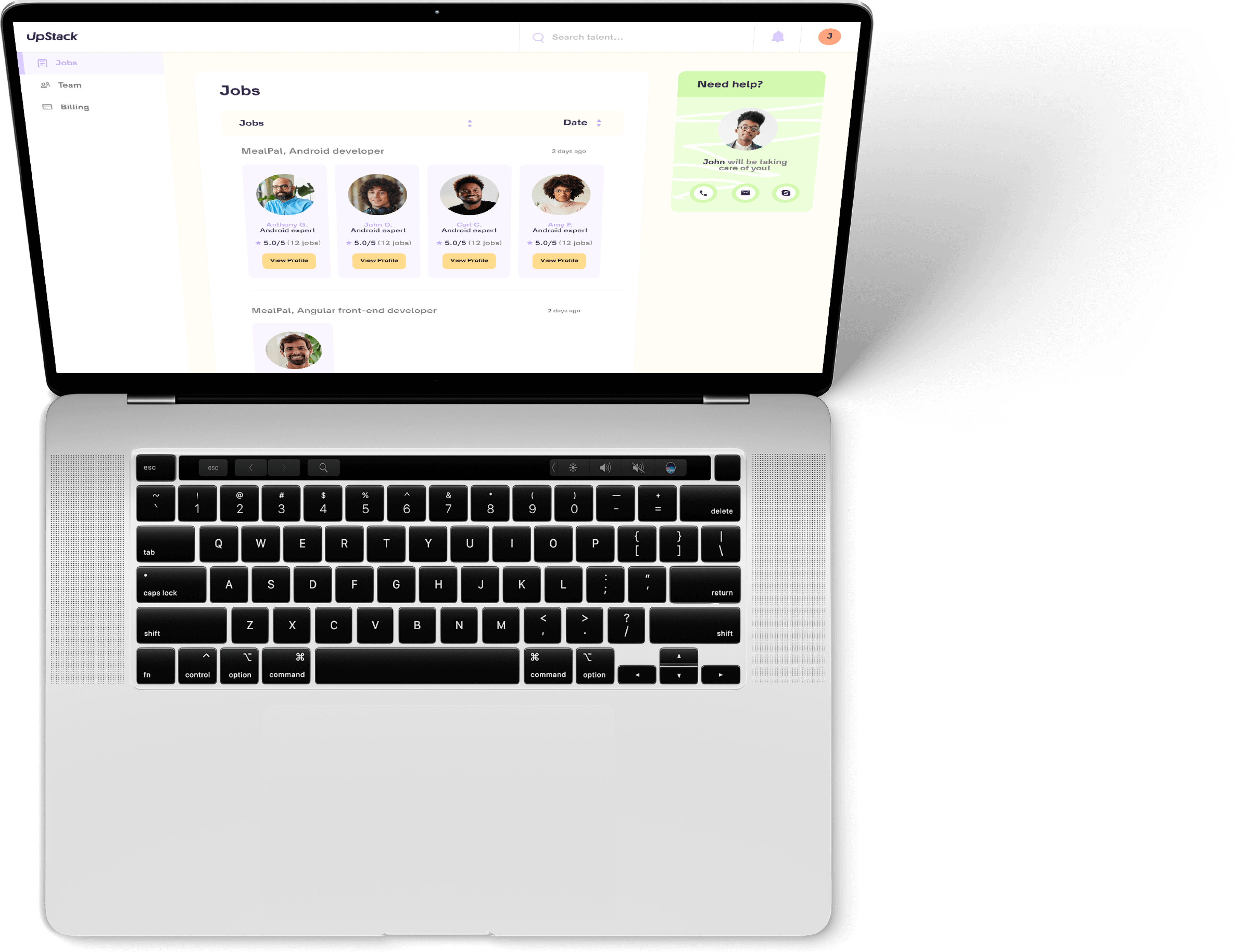


Hire DevOps Developers Remotely {Devs Ready!}
Stella B.
Available
DevOps Developer
-
Experienced DevOps engineer with seamless project implementation
-
Loves guacamole & hates spoilers

-
Marcus T.
Available
DevOps Engineer
-
Stacked portfolio of beautiful, functional websites
-
Known for his epic charcuterie & cheese boards

-
David M.
Available
Mobile Developer
-
Mobile engineering guru with a knack for translating stakeholder needs
-
Would rather be diving Palau’s Blue Corner

-
Top UpStack DevOps Developers
Hire DevOps Developers with Upstack
DevOps is an essential part of any modern software development process. It combines the best of both worlds—development and operations—to optimize software delivery and operations for better efficiency and scalability. If you’re looking to hire a DevOps programmer, there are certain things you need to know to ensure you’re making the right hire. From knowing the different roles and responsibilities to understanding the technical skills required, there are many factors to consider when hiring a DevOps developer. In this article, we’ll take a look at what you need to know before you hire a DevOps developer, so that you can be confident in your decision.
What is DevOps?
DevOps is a software process that aims to optimize collaboration between software developers and operations engineers by automating their workflows and tools. This includes taking the responsibility for the entire life cycle of software from the initial idea all the way to its deployment and maintenance in production. The goals of DevOps are to: - Reduce the lead time of software delivery. - Increase the scalability of software systems by increasing resource utilization and reducing waste. - Improve the reliability of software systems by reducing risk and increasing automation. A DevOps developer is someone who has expertise in both development and operations, and is able to build a streamlined workflow that enables both teams to work more efficiently together. This means that they’re able to identify inefficiencies in the development and operation lifecycles, and then use their expertise to fix these issues. This results in faster and more efficient software delivery, and improved software reliability and scalability.
Different roles and responsibilities of a DevOps developer
A DevOps engineer has a wide skill set, and often holds multiple roles, or has a hybrid role. This is because the job requires a mix of development and operations skills, along with a high level of familiarity with the software delivery process. The responsibilities of a DevOps engineer can vary from one organization to another. They can also vary from one project to another. But, in general, a DevOps engineer is expected to perform the following functions: - Automation - A DevOps programmer should be skilled in automating the development and operations workflows. This includes writing scripts and automating infrastructure configurations. - Configuration management - Configuration management is essential to the DevOps workflow. It allows engineers to create a common environment across all teams in the organization. This allows engineers to work more easily together, and to replicate production environments easily, which is critical to testing and deployment. - Continuous delivery - Continuous delivery is a critical component of the DevOps workflow. It ensures that every change is tested before it’s deployed. It also helps to create a consistent flow of software delivery and reduces the risk of mistakes during deployment. - Infrastructure as code - Infrastructure as code (IaC) allows engineers to manage infrastructure like they would code. This makes it easier to automate tasks and scale infrastructure. IaC is often a key component of CI/CD workflows. - Performance engineering - Performance engineering helps ensure that software systems have the capacity to scale, and that they can handle high loads.
Technical skills required for a DevOps programmer
While there are many skills that are required for a DevOps engineer, there are a few in particular that are critical. When hiring a DevOps engineer, it’s important to confirm that they have a strong foundation in the following technical skills: - Architecture - Architecture is a skill that’s used throughout the development process, from ideation and design all the way to implementation. It’s important to confirm that a DevOps engineer has strong architectural skills, as this can help them to identify inefficiencies and trends throughout the entire organization. - Automation - Automation is an essential skill for a DevOps programmer. It allows them to reduce manual and repetitive tasks, and to make processes more efficient. Automation is often required during continuous integration and continuous delivery. - Configuration management - Configuration management is an important part of the DevOps workflow. It allows engineers to create a common environment across all teams in the organization, which is critical to replication and testing. - Continuous integration - Continuous integration is a critical component of the DevOps workflow. It ensures that every change is tested before it’s deployed. Continuous integration also helps to create a consistent flow of software delivery. - Infrastructure as code - Infrastructure as code allows engineers to manage infrastructure like they would code. This makes it easier to automate tasks and scale infrastructure. - Performance engineering - Performance engineering is a crucial part of the DevOps workflow. It helps ensure that software systems have the capacity to scale, and that they can handle high loads.
Understanding the DevOps culture
A company’s culture is an important part of hiring any type of employee. It tells you a lot about the organization, and can help you determine if it’s the right fit for you. Culture is important when hiring a DevOps engineer because it can help increase your team’s overall happiness, productivity, and retention rates. Hiring a DevOps engineer who fits well with your team’s culture can help to improve morale and incentivize employees to stay with your organization longer. When hiring a DevOps engineer, it’s important to understand the company’s culture and to see if it’s a good fit for you. Here are a few questions to consider: - What is the company culture like? - Does the company promote a healthy work/life balance? - What is the work environment like? - What is the onboarding process like? - How does the company promote learning and mentorship? - What is the compensation and benefits package like?
Tips for interviewing a DevOps engineer
When you’re ready to start interviewing candidates for the DevOps engineer role, it’s important to prepare a list of questions beforehand. This will help you to stay focused throughout the interview, and will help you to confirm that the candidate is the right fit for the job. Here are a few questions to consider: - What is your current role? - What are some of the biggest challenges that you’ve faced in your role? - What are some of the biggest successes that you’ve had in your role? - Tell me about a challenging project that you’ve worked on. What were the biggest challenges that you faced? What did you do to overcome those challenges? - If you could start your career over, what would you do differently?
What to look for in a DevOps engineer
There are many qualities and characteristics to look for when hiring a DevOps engineer. It’s important to confirm that they have a strong technical skill set, but it’s also important to consider the following: - Cultural fit - As we discussed above, culture is an important part of hiring a DevOps programmer. It can help you to determine if the candidate is a good fit for your organization. - Experience - Experience is important when hiring a DevOps engineer. It will help you to understand the candidate’s skill set and background. It will also help you to confirm that they have the required expertise for the job. - Priorities - It’s important to confirm that the candidate has the same priorities as your organization. This includes the importance of things like continuous integration and collaboration.
Benefits of hiring a DevOps engineer
There are many benefits of hiring a DevOps engineer. It can help improve software delivery and operations, and can also result in faster time to market. It can improve collaboration between teams and increase team productivity, which is important for growing organizations. Hiring a DevOps engineer can also help to lower costs, because it can help to prevent software rework by using automation to reduce manual tasks. It’s important to keep in mind that hiring a DevOps engineer isn’t a quick fix for poor software delivery. It’s important to hire the right person for the job, provide the right resources, and to give them the time required to implement their process. There are also a few drawbacks to hiring a DevOps engineer. It can be expensive, and it can take time to see results from hiring a DevOps engineer. It’s important to make sure that the person you’re hiring is the right fit for the job and your organization.
They trust Our DevOps Developers
Why hire a DevOps developer with Upstack
![DevOps Developer and Programmer Icon]()
Top DevOps talent pre-vetted for a perfect fit.
Our 8-point assessment evaluation ensures that every senior DevOps developer you interview exceeds expectations across technical, cultural, and language criteria.
![DevOps Programmers Computer Icon]()
Hire reliable, passionate DevOps developers.
From late-night sprints to jumping on a last-minute face-to-face, we ensure that your recruits are down to get the job done right.
![DevOps Programmers High Five Icon]()
Risk-free 14-day trial.
Confidently onboard candidates with our no-questions-asked trial period. We’ll walk you through the contract-to-hire process if and when you’re ready to make it permanent with your new DevOps engineer.
![DevOps Computer Programmer Icon]()
Our Client Success Experts provide white-glove service.
Stay laser-focused on your business goals while our team of experts curates potential candidates and manages seamless programmer onboarding.
![DevOps Developer Writing Notes Icon]()
Build your optimal team confidently, quickly.
UpStack handles everything including background and reference checks, legal issues, and more. Our platform streamlines billing, timesheets, and payment all in one easy-to-access place.
Schedule a call with a Client Success Expert to get starting hiring a DevOps developer.
Start hiring Start hiring Start hiring
Hire from the Best.
Working with our Client Success Experts, we’ll help you build the remote team of your dreams with top DevOps talent from around the world.
Pre-vetted, reliable DevOps developers are standing by.





Hiring DevOps Developers | FAQs
How much does it cost to hire a DevOps developer?
UpStack has a simple billing model where each DevOps developer has a standard hourly rate averaging between $65-$75 per hour. Rates are based on skills, knowledge, and experience, and our developers are available mainly for full-time engagement (40 hours per week) and the occasional part-time opportunity (20 hours per week).
What is the process to find a DevOps developer?
You’ll connect with an UpStack Client Success Manager to determine your immediate needs. Our team uses a combination of AI and personal assessment to short-list candidates that match your job requirements. From there, you interview, select, and onboard the perfect developer, all within days of your initial call.
How does UpStack find its DevOps developers?
UpStack’s talent recruitment team connects with software developers around the globe every day. Each DevOps programmer is vetted for technical, communication, and other soft skills necessary for a developer to successfully work with your team. Once vetted, the candidates are accepted into the UpStack developer community.
How is UpStack different from an agency or recruiter?
UpStack's community of available, pre-vetted engineering talent means minimizing roadblocks to scaling your team effectively, efficiently, and immediately. Our Client Success Experts work with you and your UpStack developer to ensure a smooth and seamless engagement.
Can I hire UpStack DevOps developers directly?
Yes, you can hire UpStack DevOps developers at any time, and with the same assurance of smoothly on boarding talent risk-free. First, we’d create a job opening on our portal. Then, we’d vet, interview, and match developers that meet your needs. If you’re satisfied at the end of the 14-day trial period, at any time you can directly hire them.
Popular DevOps FAQs
What is DevOps?
DevOps is a software development approach that aims to improve the collaboration and communication between software developers and IT operations professionals. The goal of DevOps is to bring these two groups together in order to improve the speed, quality, and reliability of software delivery. DevOps is based on the idea that developers and IT operations professionals should work together throughout the entire software development process, from design to deployment. This involves using a range of tools and practices, such as version control systems, continuous integration and delivery, and infrastructure as code, to automate and streamline the software delivery process.
One of the key benefits of DevOps is that it allows organizations to deliver software updates and new features more quickly and reliably. It also promotes a culture of continuous improvement, as developers and IT operations professionals can work together to identify and address problems as they arise. DevOps is a valuable approach for organizations that are looking to improve their software development and delivery processes in order to become more agile and responsive to the needs of their customers.
How do agile and devops interrelate?
Agile and DevOps are both approaches that are designed to improve the speed, quality, and reliability of software development and delivery. They share many common principles and practices, and they often work well together. Agile is a software development methodology that emphasizes the importance of collaboration, flexibility, and rapid iteration. It is based on the idea that software development should be an iterative process, with developers working in short sprints to deliver small increments of working software. Agile methodologies also place a strong emphasis on the importance of communication and collaboration among team members.
DevOps is a software development approach that aims to improve the collaboration and communication between software developers and IT operations professionals. It is based on the idea that these two groups should work together throughout the entire software development process, from design to deployment. DevOps relies on a range of tools and practices, such as version control systems, continuous integration and delivery, and infrastructure as code, to automate and streamline the software delivery process. While Agile and DevOps are distinct approaches, they are often used together to improve the efficiency and effectiveness of software development and delivery. By bringing together developers and IT operations professionals and encouraging them to work closely together, organizations can use Agile and DevOps to deliver software updates and new features more quickly and reliably.
Why does devops recommend shift left testing principles?
Shift left testing is a software testing approach that emphasizes the importance of testing early and often in the development process. It is based on the idea that the earlier defects are identified and fixed, the easier and less expensive it is to fix them. DevOps recommends shift left testing principles because they align with the core principles of DevOps, which include a focus on collaboration, continuous improvement, and rapid iteration. By testing early and often, organizations can catch defects earlier in the development process, which can help reduce the overall cost of fixing them. This can also help improve the quality and reliability of the software, as defects are more likely to be identified and fixed before the software is deployed to production.
Shift left testing can also help organizations deliver software updates and new features more quickly and reliably. By testing early in the development process, developers can identify and fix defects before they become more difficult and costly to fix later on. This can help reduce the risk of delays or problems during the deployment process. Shift left testing is an important principle in DevOps because it helps organizations deliver high-quality software more quickly and reliably, while also reducing the cost of fixing defects.
What is clcd in devops?
It is unclear what you are referring to with the acronym "CLCD" in the context of DevOps. It is possible that you may be thinking of a different acronym or concept, or that "CLCD" is being used in a specific context that I am not aware of. Without more context, it is difficult to accurately provide further information on this topic. If you have a specific question or concern related to "CLCD" in the context of DevOps, please provide more information and I will do my best to help.
Is Azure DevOps free?
Azure DevOps is a set of development tools, services, and features that enable teams to plan, develop, deliver, and maintain software more effectively. Azure DevOps is offered by Microsoft as a cloud-based service, and it includes a range of features such as version control, work tracking, continuous integration and delivery, and more. Azure DevOps offers a free tier that includes a limited set of features. With the free tier, teams can use Azure DevOps to manage code repositories, track work, and implement continuous integration and delivery pipelines. However, the free tier does have some limitations, such as a maximum of five users and limited storage and build minutes.
In addition to the free tier, Azure DevOps also offers paid plans that include additional features and support for larger teams. These plans are designed for organizations that need more advanced capabilities, such as support for on-premises servers, private build and release pipelines, and more. Azure DevOps can be a useful tool for teams looking to improve their software development and delivery processes. Whether you are using the free tier or one of the paid plans, Azure DevOps can help your team work more efficiently and deliver high-quality software more quickly.















